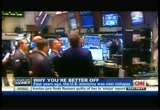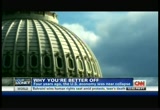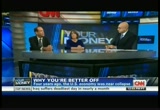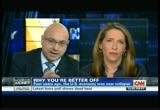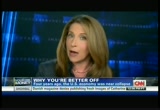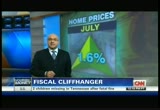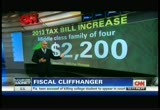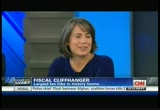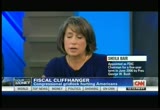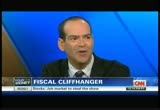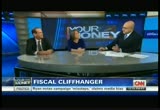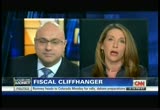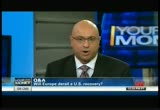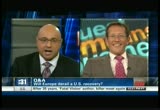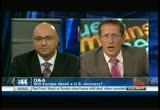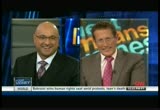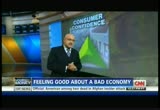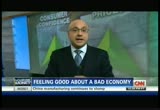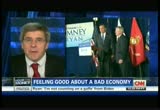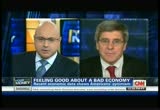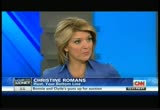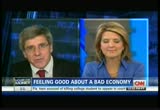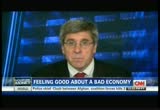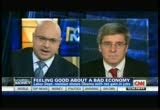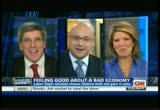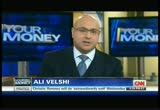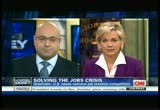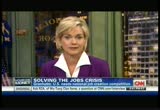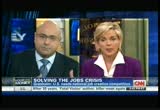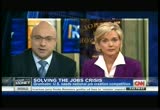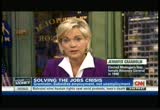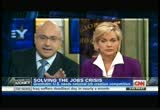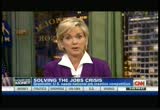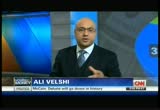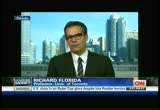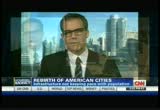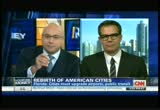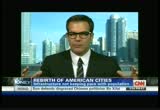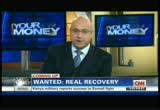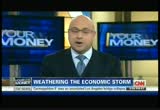tv Your Money CNN September 30, 2012 3:00pm-4:00pm EDT
3:00 pm
. there is a question being asked in this campaign, are you better off today than you were four years ago? i'm ali velshi. this is "your money" and the answer is yes. four years ago this week, america and the world marched to the edge of the economic abyss. >> major sectors in america's financial system are at risk of shutting down. >> the financial sector actually shut down with the collapse of lehman brothers. >> we have a big problem. >> but it had morphed into a degree of global credit. congress was presented with one
3:01 pm
choice and one choice only. >> it's important to get credit flowing again. >> bail out the banks, the banks that got us into this mess in the first place. >> should there even be a bailout? >> americans protested and lawmakers balked. >> americans are angry and so are my colleagues. >> on september 29, the bill to save the economy went down to defeat in the house of representatives. >> the legislation has failed. >> i'm very disappointed in today's vote. >> so to the democrats skprerep who vetoed this bill yesterday, i say step up to the plate. >> this is what brought us to the brink of collapse. >> wow. all because annie went and got a house he couldn't afford? >> i don't know whose fault that was. >> $1.2 trillion in market value wiped out in one day. congress quickly reconvened, and four days later, on october 3rd,
3:02 pm
it passed the $700 billion troubled asset relief program. >> congress has agreed to a broad deal that authorizes the presidential secretary to free up the criticisms. that may be the last time the president witnessed something that really mattered to washington. four years later, and on the eve of another election, he's being asked, are you better off off than they were. but how much money could you have? if washington had put aside its pride, they could work with some people. >> these two have had your back. sheila baer's job was to deal with banks. neil's job was to be a watchdog over t.a.r.p. he wrote a book called
3:03 pm
"bailout." investigating wa investigating. to say things are just as bad now as they were then is just wrong. >> if you're an executive looking at losing your job and your bonuses, certainly when they were how they were in 2010 as they were in 2008. if you're someone who is now enjoying their 99th week of unemployment, you may differ with the fact that you're necessarily better off. certainly overall, we have a much more stable economy and things are hopefully on the upswing, but there is a lot of people who are unnecessarily left behind. >> sheila, your new book is called "bull by the horns. fighting to save main street from wall street and wall street from itself." the title of your two books have
3:04 pm
a similar theme to them. both of you think chicago and washington haven't done enough in four years ago. what do we have to do to ensure there's not this fight between main street and wall street. >> i think wall street has to be different than -- if you view what's very. you even hear that now, so the bailouts were successful because they made money. yeah, they were successful in making sure all the banks were profitable, paying big bonuses again. that's the barometer of success. i don't agree with that. i think you look at what's going on in the economy. it helped the banks but it's hard to say we're from a. things were definitely spinning out of control.
3:05 pm
the lack of of information was pro mound. we didn't really know what we were dealing with, but in 2009, we certainly should have done a lot more with getting targeted reconstruction. it's to. they can spend time on that ballot sheet. they're not going to take new risks to support the academy. >> jessica yell in, chief white house correspondent staff. four years ago, carpet both said don't feed the fat cat any and that cost america its credit union. today whael. it looks to me like they're doing the same thing.
3:06 pm
>> right. they're not taking action on titlery form, tax reform, all these issues that will come up when sequestration comes up at the end fortunate year and when they have to deal with bush tax cuts at the beginning of next year. this is really an irresponsibility that's shared both by congress and the white house, because when they negotiated the debt deal last year and set up this sequestration, this sort of eco-neurological showdown, they knew it had to be negotiated in a net election year if it didn't git worked out until last fall. so every every kicked the exam pain. >> i'm telling you about this economic storm that hit us. growth in the united states is slow. we're selling a few manufacturing goods. guess what, americans.
3:07 pm
. it's all this confidence misplaced. we're going to talk about this, next. [ male announcer ] now you can swipe... scroll... tap... pinch... and zoom... in your car. introducing the all-new cadillac xts with cue. ♪ don't worry. we haven't forgotten, you still like things to push. [ engine revs ] the all-new cadillac xts has arrived, and it's bringing the future forward.
3:08 pm
my name is adam frucci and i'm the i love new technology,om. so when i heard that american express and twitter were teaming up, i was pretty interested. turns out you just sync your american express card securely to your twitter account, tweet specific hashtags, and you'll get offers on things you love. this totally changes the way i think about membership. saving money on the things you want. to me, that's the membership effect. nice boots!
3:09 pm
since ameriprise financial was founded back in 1894, they've been committed to putting clients first. helping generations through tough times. good times. never taking a bailout. there when you need them. helping millions of americans over the centuries. the strength of a global financial leader. the heart of a one-to-one relationship. together for your future. ♪
3:10 pm
i am not one to bet against the american consumer but something weird is afoot in this economy. let's start with housing. forget the silver lining, it's the gold lining around the s and l clouds. it showed home sales went up 1.6% in july. that's a positive sign that they went up and they were up in 28 major markets in the united states. they showed a 9% increase in september, and our own polling shows that two-thirds of americans think that economic conditions are going to be good a year from now. clearly, no one is all that
3:11 pm
concerned about the economic storm i've been telling you about. congress has done nothing to head off the fiscal cliff coming in january. many of you tweak me saying, i'm fearmongering and that they'll get to it after the election. but here's what they're gambling with. $7 trillion in tax hikes scheduled to start at the beginning of the year. the white house estimates that a typical middle class family of four would see their tax bill increase by $2,200 in 2013. jessica, president obama could win, congress could come back with the same composition is has now. what does the president do between election day and the end of the year to protect americans from the fiscal cliff? >> obviously there's two scenarios. one where he will not extend the bush tax cuts for the wealthiest americans. so the fiscal cliff is going to be folded in some way into renegotiating the tax cuts and how they get extended.
3:12 pm
i think he'll say it's a no-go, i'm not going to extend the bush tax cuts, so either we can negotiate it now and these few remaining weeks before christmas, or we have see the government shut down. i think there will be a little chicken game playing at the end of the year. what most people in washington likely think will happen is they'll negotiate some way to say here's a broad framework for what both sides want. let's work it out next year. >> sheila behr, i think americans are excited about the future. i'm glad people are feeling a little bit better about it, we all are. what has to happen so that a year if now we're not talking about the 9% versus the 1% and that there is some sense that banks are finally helping america move forward. >> it is your influence policies
3:13 pm
that jam the lens. the person they can get by lending into a still uncertain economy has. they can take their cheap money, reinvest it overseas, so i don't think the zero interest rate policies, i know they're designed to be doing just the opposite. also, congress needs to get its act together with the president and this administration. there needs to be, certainlily with the real economy, it was the game plan on practice and entitlement spending, but how are we going to get our fiscal house in order? . and those are really the tough decisions they haven't made yet and seem unwilling to make. >> neil, it seems odd to us when we look at europe, all the countries that need bailouts,
3:14 pm
and they say, i want the money with fewer conditions and they say, no, you can't have it with fewer conditions. when t.a.r.p. happened, there was a sense of, i have to get this money out here right now. doesn doesn't. this is really the giant too big to mail banks of east europe. >> all you do is save a broken status quo, which is what we did in this country. we saved a system practice. will do so again if there's not such meaningful change. >> their top position. the type of systems you're talking about would have made the other banging systems safer. so what haven't we done? >> we still have these.
3:15 pm
it will still produce a lot of dangers. you see things like jp morgue ran on his back with a whale. this is part of a problem that are not only big to. we have to do this as a financial institution, whether it's within the confines of cutting into little pieces, which is what i would advocate. sheila, when you went in to take care of a bank, you had a whole system. you knew exactly how would unfold. >> right. >> you've advocated that system. >> right. >> i think the fdac has come forward with a good blueprint on how they would be resolved and keeping taxpayers from any exposure. i think they both need support
3:16 pm
from the treasury department and the feds. i would like -- he hasn't. >>. alec, you know, i think this is a fabulous and fascinating conversation, and i wish this was something everybody in washington talked about. this is not something on the front burner for people in leadership in congress or frankly in the white how else. the white house, the most they'll push out are these executive actions to try to alter some elements of helping some homeowners, but i do not hear any push in congress by leadership to do any of this. >> as you have pointed out to us many times, there are conversations that should be taking place in the election generally that aren't coming up. >> sheila baer and neil
3:17 pm
3:18 pm
3:20 pm
we are getting a fuzzy picture of a u.s. economy that can't get its footing. consumers are feeling more upbeat and an improvement in housing probably has a lot to do with that. we just talked about the threat of the fiscal cliff, the u.s. centered storm, but we cannot ignore the head winds coming from europe. joining me now to debate this topic is host of "quest heemean business" on cnn international. richard, the question is will
3:21 pm
europe derail a u.s. recovery? give me 60 seconds on the clock starting right now. richard, the answer is categorically, absolutely yes. the storm hanging over europe just won't go away, and each day that it stays there is another day that europeans who have been among the biggest and best consumers of u.s.-produced goods and services are buying fewer and fewer of them despite two years of bad governance and poor decision making in europe, americans are sortly weirdly feeling better about their own economy. richard, evidenced by this week's consumer spending and housing numbers, but cheap money and low home prices are driving the americans sugar high. in the end, the austerity measures in europe are crushing its already pulverized economies into smithereens. the eurozone has an unemployment rate of 11.3%.
3:22 pm
broke customers, richard, are bad for business. poor americans have to keep their one eye on washington and one on europe. if there's any hope of getting out of these economic doldrums, don't make your problems our problems, richard. >> read my lips! and read the question! will europe derail the u.s. economy or recovery? possibly, perhaps, but not inevitably. of course europe has problems, no question about it. the eurozone is in recession, and the ecb is about to start the printing presses. but the u.s. economic miracle, the recovery, is by no means as strong as you would have us suggest. read last week's edition of the economist and others just to see exactly what is happening. manufacturing isn't as strong as people suspect.
3:23 pm
there are worries about chinese economy and china's relationship and, of course, there are serious concerns about the fiscal cliff. so ali velshi, by all means the europeans take their fair share of the blame, but it's nonsense cal for you to believe that all the blame is on this side of the atlantic. >> well, you've evolved a bit because at least you didn't start by saying americans started this four years ago, so we're getting somewhere. richard, a pleasure as always. >> as always. coming up next, i'm going to congratulate you for something you've done over the past few weeks. it wasn't easy and it may not even pay off in the long run. but it's 100% american. [ female announcer ] research suggests cell health plays a key role
3:24 pm
3:25 pm
3:26 pm
♪ [ male announcer ] this is karen and jeremiah. they don't know it yet, but they're gonna fall in love, get married, have a couple of kids, [ children laughing ] move to the country, and live a long, happy life together where they almost never fight about money. [ dog barks ] because right after they get married, they'll find some retirement people who are paid on salary, not commission. they'll get straightforward guidance and be able to focus on other things, like each other, which isn't rocket science. it's just common sense. from td ameritrade. i've been warning you for months, there is an economic storm coming our way from europe and you need to take cover. i've given you reasons why. i pointed my finger at politicians who aren't doing enough to shelter you. i argued with economists, i even
3:27 pm
blamed you for your part in this. after all that, i got to give you some props. all you see is sunshine and blue skies ahead. despite those threatening thunder clou thunderclouds out of europe, the inconsistent monthly jobs report and the ongoing scorched earth politics in washington, apparently you are feeling pretty good. consumer confidence jumped in september. take a look at that, by nine points. optimism about the jobs market drove that increase despite the fact we only added 96,000 jobs last month. let's see what we do when we get the jobs numbers on friday. not so bad, 96,000 jobs. never mind this week's forecast for higher inflation. that's not bothering you. or the puny increase that we saw in your wages when they were measured on friday. in fact, you're feeling so good you're even buying homes again. two different reports on the housing markets showed big price jumps this week, and even though sales of new homes fell slightly from the month before, analysts are saying that's because homebuilders couldn't keep up with the demand.
3:28 pm
finally, economic growth, gdp. pathetic. the u.s. grew at a paltry 1.3% annual rate during the second quarter of this year, the second three months of this year. that is lower than the last measure we had for the same period. you're not worried, the stock market even went up after that. so while you're not listening to my economic storm warning, you are doing something that i commend. you are making the economy the most important issue in this election. we all got sidetracked with other issues but the economy should actually be number one, and where the votes really matter, it seems you're favoring president barack obama. i want to bring in steven moore. he's an editorial writer for the wall street journal and a good friend of the show. christine romans also joins us. she's host of "your bottom line" right here on cnn. i want to shoe yw you a poll of likely voters. in ohio, florida and pennsylvania, 51% say president obama would do a better job on
3:29 pm
the economy. no incumbent has won the white house without winning florida. ohio and pennsylvania are crucial states. steven, despite the economy right now, this weird optimism, is this the end of romney's chance to win? >> yeah, i think this upsurge in consumer confidence is hurting mitt romney, no question about that, ali. interestingly, i looked at the gallop data on consumer confidence, and they came to an interesting conclusion. they found that the big surge in consumer confidence on the economy was democrats, that democrats have had a huge surge where republicans have actually had a reduction in their confidence, and what they found, by the way, is that normally an increase in consumer confidence leads to the incumbent president doing better in the polls. they found in this case it was the opposite, that the increase in the numbers for obama in the polls has actually made democrats more optimistic about the economy. >> interesting. so the idea of who might win the
3:30 pm
election is actually affecting the question. >> it appears so. it really does. i'm kind of optimistic. i like to look at this glass half full. you're right that there are some signs of an economic cloud ahead, but, you know, there are some pretty positive signs, too. you've got this trillion dollars of capital on the sidelines, you got these low interest rates that i think can help growth, and you mentioned housing. ali, we haven't built virtually any new housing in five years in this country. you have to think that housing is really going to start picking up. >> steven moore, have you become a democrat? >> no. i think if mitt romney was to pull this out, i think the economy is really going to do well this year. >> for three squares like us, the gdp actually matters, and the reading we got on the gdp this week surprised us. mitt romney hit president obama this week about the gdp number. listen. >> look at the numbers that just came out in the growth of our economy. 1.3% versus russia at 4%?
3:31 pm
china at 7 to 8%? we're at 1.3%. this is unacceptable. it is not working. >> christine, mitt romney has a point. that gdp number shows a very weak economy. americans are feeling better about the economy despite the fact we have hard numbers that show the economy is not doing well. what's going on? >> so the consumer confidence is taken from the third quarter, right? that was the second quarter. we know in the second quarter we had a drought, and that drought was something that suppressed economic activity and we also knew that drought was temporary and could be overcome. the question is, are people feeling better as we get close to the election because the economy isn't -- >> you're saying it's enough. >> it's a rearview mirror indicator, and now people are looking guarforward. you look at the polls over and over and a majority of people say feels bad now, i think it's going to be better next year. you're starting to get a little
3:32 pm
optimism, and that's because this was an emergency for four years. now bad things about the economy have become chronic, not emergency anymore. people in a weird way are getting used to the fact they have to lower their expectations. i keep saying that it's been four years, exactly four years since this thing started. we've all got an undergraduate economy. . >> let me say something, i worry about this, actually, that we're declining expectations. that's not america. i want your viewers to read the ted to recall we wrote on friday called "as good as it gets." when john f. kennedy ran for president in 1960 against nixon, his theme of that campaign is, we can do better. and he was saying basically, look, the economic growth rate is not high enough. we can have more employment in this country. what's interesting is, the value
3:33 pm
of the economic growth was higher than it is today. by waithe way, ali, i have not become a democrat. what i'm saying is mitt romney really needs to reach out to america's aspirations and say, this economy is not doing nearly what we want. >> if you're part of the economy, you've got a job and you've got a little money in the bank, you're moving forward again. you're refinancing. >> how confident is the housing kmel to. people's wealth was falling the value of their home which is still, for most americans, their primary asset, was falling in value. if we can see an increase in home values and we can see more home starts, i do think that gifrz gives a big bump up in the economy. as i've said many times on this show, the one thing i'm most worried about is the tax
3:34 pm
increase happening in 2013. i do think that could shove us over the cliff to a potential double recession. >> that's going to be one of the biggest tax increases in history, i think. it will be about 2 to $4,000 per family. >> the nation went back to crunch the numbers and show that president obama had a net gain of 125,000 jobs. 4.4 million jobs lost on his watch. bottom line, he regains every job lost on his watch. man up. do it now. repeat after me. president barack obama is the job creator in chief. say it. >> i'm not going to say that because i still think this is a miserable performance on jobs. we should be creating two to three more times the jobs we are per month. i'll give you the fact they revised upward those economic numbers, but they revised
3:35 pm
downward the gdp growth number, and even more importantly, the census bureau numbers came out for the increase in incomes in august. there is a hundred-dollar decline in family incomes just over that month, so that means with barack obama this is a g d good. . >> and that's a key point. the jobs replaced are not the ones that were lost p. steven moore, always a pleasure to see you. christine, good to see you. coming up -- listen to this. >> we have the cutest, curvaceos jennifer grandholm. today her personal might read something like this. former governor of nixon seeks
3:36 pm
someone with job competition. hosts a television show and enjoys speaking at national political conventions. when she comes down, that's it more with noo your money." [ female announcer ] kristine tweets, "have a yoplait. heaven on your palate." in other heavenly news, all our yoplait light flavors are now 90 calories each. and cue the angels. what? ok. we don't have angels. yoplait. it is so good.
3:37 pm
>> announcer: this is the day. the day that we say to the world of identity thieves "enough." we're lifelock, and we believe you have the right to live free from the fear of identity theft. our pledge to you? as long as there are identity thieves, we'll be there. we're lifelock. and we offer the most comprehensive identity theft protection ever created. lifelock: relentlessly protecting your identity. call 1-800-lifelock or go to lifelock.com today. ally bank. why they have a raise your rate cd. tonight our guest, thomas sargent. nobel laureate in economics, and one of the most cited economists in the world. professor sargent, can you tell me what cd rates will be in two years? no. if he can't, no one can.
3:39 pm
one of the most effective shelters we can build to protect us from the economic storm is infrastructure. the jobs created won't just help us get through this storm, they will create projects that will boost u.s. prosperity for decades to come and u.s. competitiveness. i want to bring in jennifer grandholm. she is host of "the war room." she is author of "governor's story." governor grandholm wants to do
3:40 pm
for jobs what she's trying to do for education. her plate launches a competition to fill a critical national need. it would help the public-private partnerships. the fund would come from money america currently spends on economic development. thanks for joining us. >> you bet. thanks for having me on, ali. >> how do you ensure that we undertake projects using private and public money that do create jobs and fix problems as opposed to the accusation that we get from a lot of conservatives that say, these things are just pork. >> first of all, in states it's happening all the time, anyway. every state almost has an economic development agency that has identified that state's strengths, weaknesses and opportunities. a swat analysis, if you will, and they decided to focus on areas of strength inside the
3:41 pm
state's geographic borders. what i'm suggesting is to put that kind of effort on steroids, n knowing our economic allies, they aren't being that aggressive. how do you make sure it's effective? you want to make sure the government's dollar is the last dollar in. or if it's a tax incentive, which is really a but-for kind of in sent tif. you're not going to be paying out money directly, it would be money that is foregone, if there were economic development inside the state. >> it's again, it would really enhance our ability to try to get infrastructure. >> it's pretty consistent from people who say, why isn't the government involved.
3:42 pm
the private-public partnerships, a lot of people say these don't create value on the taxpayer side, on the government side. somewhere it got national attention, a partnership paid the city $1.5 billion for 75 years worth of parking meter revenues and since then parking rates have gone up. the partnership is expected to turn a huge profit. the group bills the city as soon as something is taken out of service. i know it's just one example, but how do you fine the critics who can find a flaw in this? >> you have to craft it in a way that provides jobs for the citizens. it's one way of looking at that but you don't want the citizens to have to pay a huge amount of dollars in other fees, additional parking and taxation. that's why they have to be crafted in a smart way, and it's not always just an infrastructure project. it might be some kind of non-traditional infrastructure.
3:43 pm
you might decide as a nation we night want to invest in the grid, for example. how do you make that happen? partnering with the public sector, everybody has a role. if you don't have the government as a player to do things the government can do well, then you are basically forfeiting the race to other countries that are very aggressively partnering. so if you have a cluster that has both the university as a partner as well as foundations as a partner, the government, and certainly the private sector leading the way, why wouldn't you do that if it means jobs for your state? >> four and a half years ago, five years ago america got into a recession that you and michigan were very familiar with. >> we were in front of it. >> so you want to invest in people. you call it infrastructure, but it's human resources of people. you want to build a work force that is competitive internationally, and one of the things you write is we should learn from germany and subsidize employment rather than unemployment. what is it about the german model you're interested in?
3:44 pm
>> in tough economic times when things are slow, especially in this manufacturing sector, instead of showing full layoffs, the person takes a part-time salary in this country, but their salary is sected by the government. they want to keep these employees, they're just going to downplay them. you don't want the government to do it, you want them to help finance people. in michigan we did something called no worker left behind where we deployed community colleges in partnership with the private sector and the skills that they need so when somebody is done being on unemployment, they come out and they have a job in an area where there is a skills gap that's been filled by their training. >> this would take the decision
3:45 pm
from being on with companies, you're giving companies leeway in the middle to say, we can keep these employees on if you give them a little extra. it's an interesting idea. >> you're suggesting lowering the corporate tax rate on a one-time basis to allow countries to repatriatrite these pan banks. how do you make sure you're finding the right projects? how do you find a project fund bid an infrastructure bank. >> first of all, i don't think you have congress decide projects on a piece by piece process. there is great instructions on how an infrastructure bank could be constructed. but i think part of that money
3:46 pm
that's repatriated goes to maintenance and infrastructure. light grid infrastructure, light clean energy infrastructure or bean is we have to get the financing to do that and you've got all of this money, but not just to go back to the company's coffers, not to go back without seeing a benefit. direct it specifically to an infrastructure bank that could be crafted as a way to create banks and is future looking. >> governor grandholm, nice to talk to you. >> thank you. >> by waithe way, did that whol dating game work out? >> i can't believe you brought that up. i was 19 years old. let this be a warning to you young people out there. there is stuff that lasts on video for a long time.
3:47 pm
it was a bad hair day. >> when we were 19, we didn't think that happened. now you know it's all on youtube. good to see you. >> good to see you, too. >> jennifer grandholm is host of "the governor's mission." coming up, american cities fuel america's economy but their infrastructure isn't keeping up with the population. my next guest says fwheer for a building boom larger than anything we've again ♪ but what if there was a simple way to feed those in need? now, there is. shop walmart for select brands' low prices through october 12th and you help secure meals for local families. go to walmart.com/hunger and learn more about how you can join the fight. because hunger is a big problem and it needs a big answer.
3:48 pm
because hunger is a big problem ♪ chirping beeping camera ahhhh drill sound chirping electric shaver shaking remote tapping sound shaking drill chirping tapping shaking remote wouldn't it be great to have one less battery to worry about? car honking irping the 2012 sonata hybrid. the only hybrid with a lifetime hybrid battery warranty. from hyundai.
3:50 pm
3:51 pm
compared with an overall rise of less than 10%. the 5 fastest growing metro areas are austin texas, hinesville, georgia, mcechanicc texas. richard, you say cities have become more livable, but that not all cities are booming. what do the successful cities do right? >> well, i think there's a few things that successful cities do right. the most important thing is they invest in their human capital. they invest in their talented people. they have great high schools and particularly colleges and universities. but also the best cities are making themselves attractive for highly skilled, ambitious and entrepreneurial people. they have brought crime rates down low. they have cleaned up their pollution and their gardens and their water fronts and they have
3:52 pm
made themselves more liverable. >> i came from that china and i was marveling at all the infrastructure growth. even state governments which are strapped for cash are pushing back on infrastructure projects which should over time return the cash to them. but we just don't think that way in america. where do you get the impetus for large scale development in america. you've talked about building more public highways, where should it come from and where does it come from? >> i think in america, we got bogged down in an inappropriate debate over economic policy, do we loosen monetary policy, do we stimulate? do we industry policy in one sector. let's build great cities, let's rebuild our transportation systems, let's rebuild our crumbling airports, let's rebuild our sools, let's build great communities for every american.
3:53 pm
the mayors get this t local leaders get this and it's time for washington and this is what china is doing, it is building cities at an incredible rate, upgrading transportation, upgrading and improving fast rail and i think america has the ability to do this, we have just got to get with the program. >> the money often doesn't come from the government. i think every mayor in the country has some plan for hour their city can do better. you're in toronto one of my favorite cities, it has a better subway system. the a recent report says some of the most five most congested areas in the united states are chicago, washington,down and loorks. and john jess chun in those areas cost commuters more than
3:54 pm
1,000 a year, use of public transit is growing, how do we address this? >> there was a great gallup survey this week, we have said something like, 2/3 to 3/4 of americans -- our faith in congress has hit all-time lows approaching about 10% of us have any faith in our congress. i think we need only need to give more power to our cities, we have got to built the balance in terms of revenue rasing towards our city, and if we think of income tax and our tax strategy in the united states, i don't think it's just a question of how much more the federal -- i think it's tilting the balance back towards the local level which needs the tools and which needs the revenue and should be able to raise the revenue -- the great economists at brookings said a long time ago the appropriate place to make innovati innovation, competitive and economic policy is not at the
3:55 pm
national level but to empower the cities and communities to do it. i call this a reset in america. we have got to get power, not just the power to spend, but the power to plan back in the hands of the city leaders. >> thank you for joining us. >> richard florida is a professor at the university of toronto. with a slowing economy facing head winds from europe and asia, this country does need action if we want a real sustainable recovery. i laid out my case, but now i want to hear from you, i'll tell you how next. must make adrenaline pump and pulses quicken. ♪ to help you not just to stay alive... but feel alive. the new c class is no exception. it's a mercedes-benz through and through. see your authorized mercedes-benz dealer for exceptional offers
3:59 pm
the storm that's most dangerous and potentially damaging is already causing problems at home. the fiscal cliff hits at the end of the year and businesses are already reacting to the uncertainty created by your litt political leaders. if gdp was 1.3% in the first quarter this year, projections for next year may be june gradeded soon, but going off the fiscal cliff is bound to give us a recession. this is the same kind of critical moment, your economy depends on the willingness of your leaders to act. i say congress has gone from being benign to being threatening. di
149 Views
IN COLLECTIONS
CNN Television Archive
Television Archive  Television Archive News Search Service
Television Archive News Search Service 
Uploaded by TV Archive on

 Live Music Archive
Live Music Archive Librivox Free Audio
Librivox Free Audio Metropolitan Museum
Metropolitan Museum Cleveland Museum of Art
Cleveland Museum of Art Internet Arcade
Internet Arcade Console Living Room
Console Living Room Books to Borrow
Books to Borrow Open Library
Open Library TV News
TV News Understanding 9/11
Understanding 9/11
